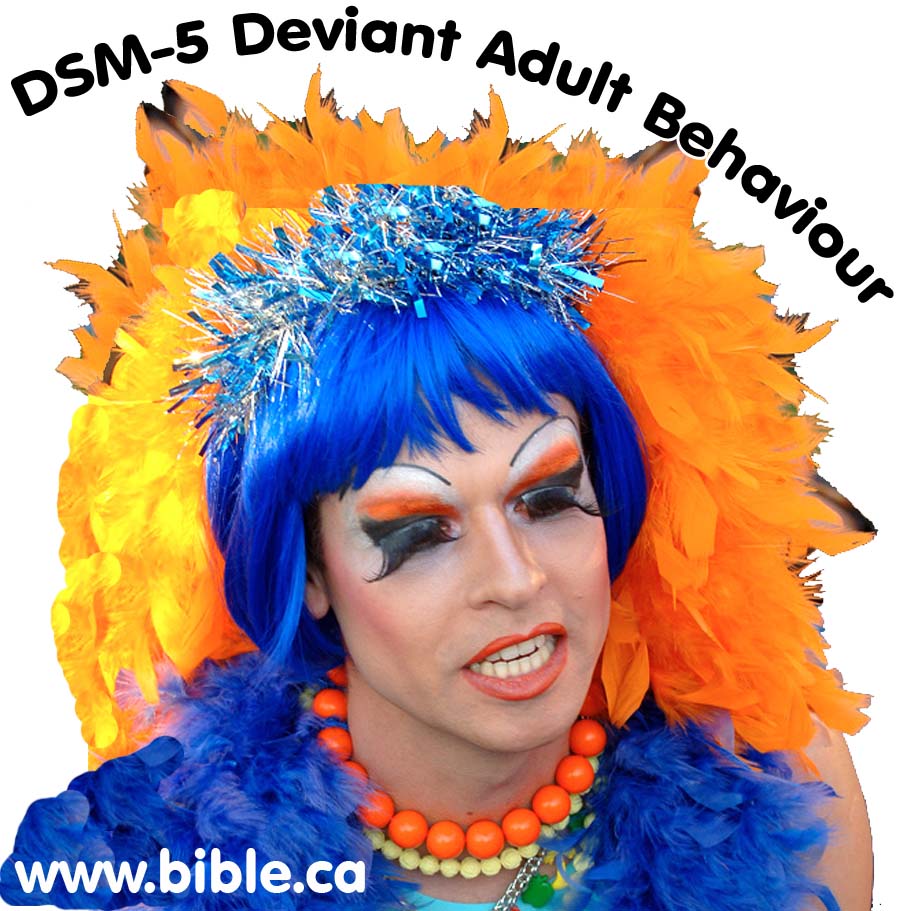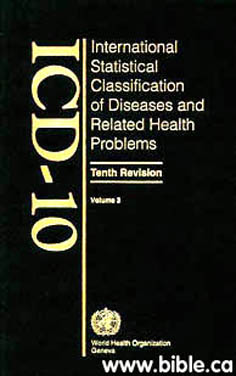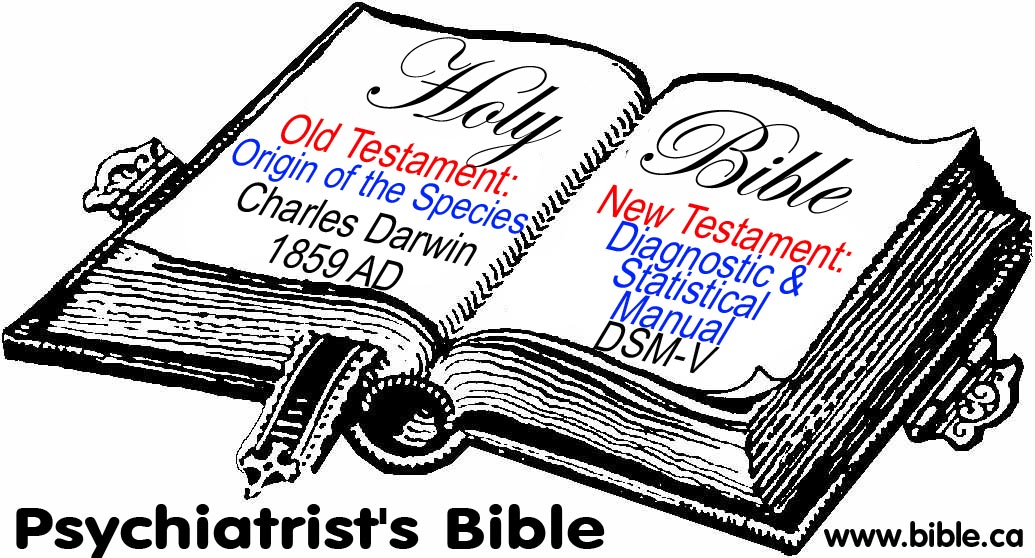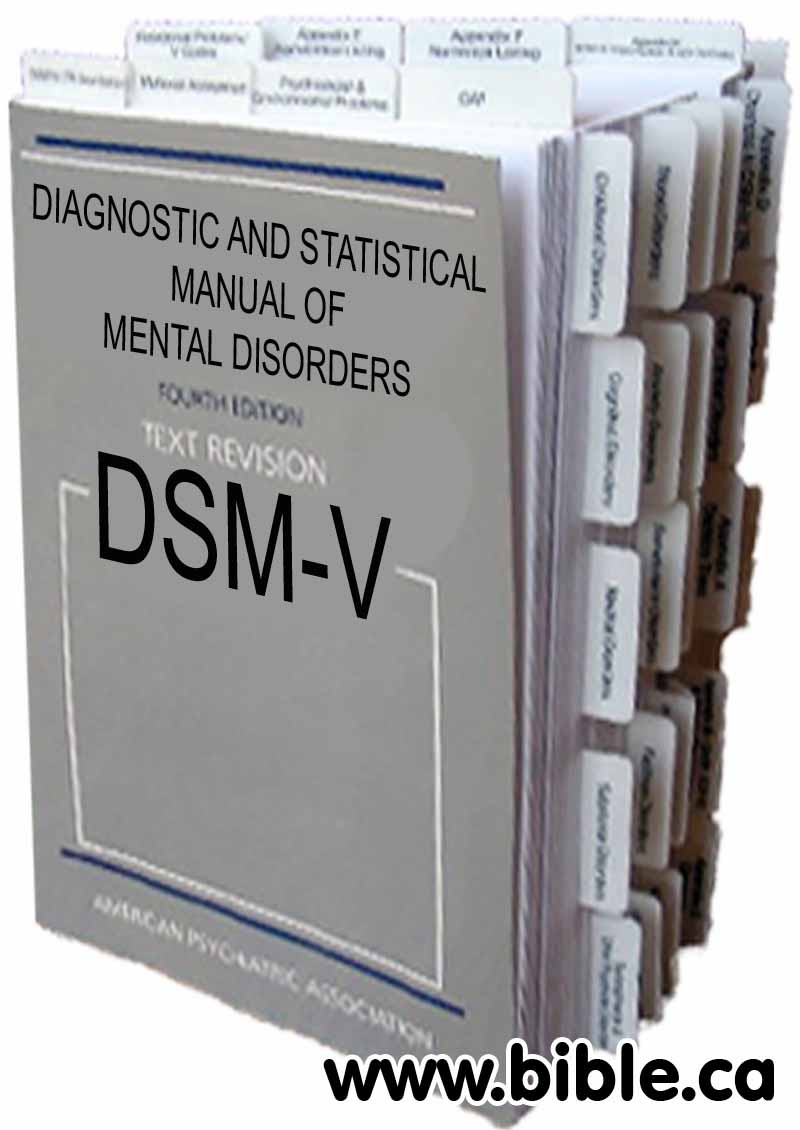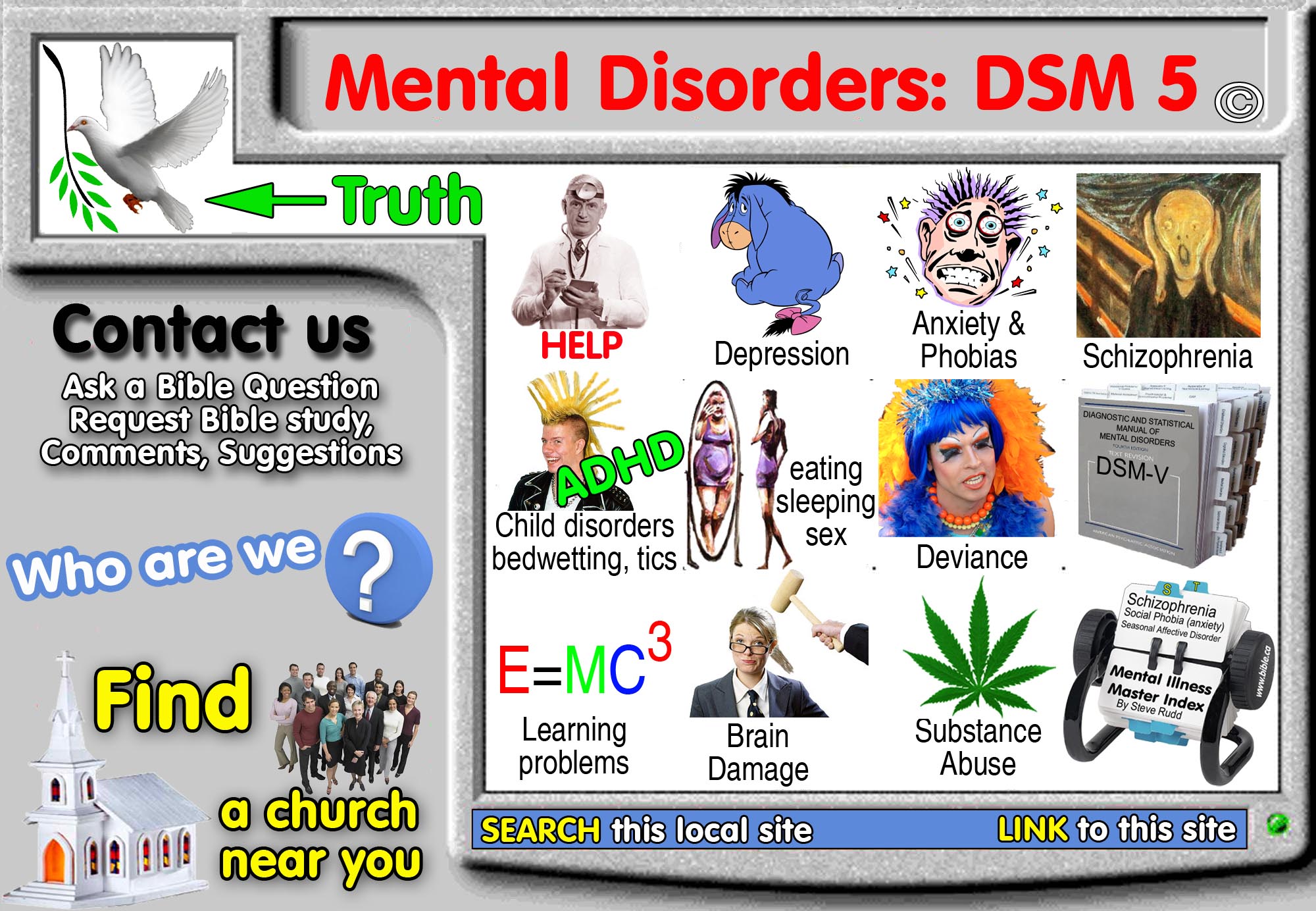DSM-IV, DSM-5, ICD-10: F60-F69 Disorders of adult personality and behavior
Nothing a good dose of the Bible and weekly church attendance can't fix!
|
|
|||
|
|
Sinful Adult Behaviour F60-F69 Disorders of adult personality and behavior If you are whiny, annoying, arrogant, violent, pessimistic, transgendered, kleptomaniac, gambler, twist your hair with your fingers till your hair falls out, this is your mental disorders page! |
||
|
|
|||
|
DSM-IV, DSM-5, ICD-10 International Classifications of Diseases Diagnostic and Statistical Manual |
|||
Introduction:
1. Typical of the topic mush of the DSM, we have a "catch all" category that includes almost every adult sinful behaviour and vice:
a. If you are whiny, annoying, arrogant, violent, pessimistic, transgendered, kleptomaniac, gambler, twist your hair with your fingers this is your mental disorders page!
b. These are not diseases but behaviour choices that are "cured" through a good dose of the Bible and weekly church attendance.
2. Psychiatry is behaviour control. None of these disorders are diseases. Instead they are all behaviour choices.
|
Mental Illness Myths: deviant sex practitioner have a mental disease |
||
|
|
Great blunders in the history of psychiatry: The myth that "deviant sex" is mental illness. and other Psychiatric Unicorns! |
|
|
|
|
|
A. deviant sex is a behaviour choice you learn, not a disease or mental illness:
1. deviant sex practitioners are made, not born. There is no genetic or chemical difference in the bodies of deviant sex practitioners over non-deviant sex practitioners.
2. deviant sex is a lifestyle moral choice, not a mental illness.
3. The gay community has an unresolvable contradiction in their logic. On one hand they want you to believe that deviant sex is genetic, being determined at conception; on the other they want you to believe it is not a mental illness.
a. Typical of the gay agenda, they love to dance with everyone, even when it makes no logical sense.
b. For example, deviant sex practitioner advocates will in one breath dismiss the bible and Christianity as their enemy because it clearly condemns deviant sex practitioner sex, but in the other, open the Bible and attempt to prove that Bible actually promotes deviant sex.
|
|
||
|
"A former deviant sex practitioner who has carried on an effective ministry for five years among deviant sex practitioners reported, 'I have counseled over three hundred deviant sex practitioners and have yet to find one that enjoyed a warm love relationship with his father.'" (The Unhappy Gays: What Everyone Should Know About deviant sex, pages 71-76) |
||
|
"Clinical studies (Green 1987; Stoller 1968, 1975a, 1975b, 1979) describe that boys with gender identity disorder often have an overly close relationship with their mother and a distant, ambivalent relationship with their father. Stoller (1968) argued that the boy who is excessively close to his mother, in absence of the father, may have difficulty in separating himself from the female body and feminine behavior." (Textbook of Clinical Psychiatry, Hales, Yudofsky, 2003 AD, p 746) |
The DNA Myth: deviant sex practitioners are made not born |
|
|
|
||
B. What biopsychiatrists, drug companies and governments say about deviant sex:
1. "Clinical studies (Green 1987; Stoller 1968, 1975a, 1975b, 1979) describe that boys with gender identity disorder often have an overly close relationship with their mother and a distant, ambivalent relationship with their father. Stoller (1968) argued that the boy who is excessively close to his mother, in absence of the father, may have difficulty in separating himself from the female body and feminine behavior." (Textbook of Clinical Psychiatry, Hales, Yudofsky, 2003 AD, p 746)
2. "There are no well-established or exhaustive explanations for the development of gender identity disorder. As noted earlier in this chapter, gender identity appears to be established and influenced by psychosocial factors during the first few years of life. However, many authors have argued that biological factors, if not causative, may predispose an individual to a gender identity disorder. It is important to realize, however, that researchers still have been unable to identify a biological anomaly or variant associated specifically with gender identity disorder." (Textbook of Clinical Psychiatry, Hales, Yudofsky, 2003 AD, p 746)
3. "Etiology: As with adult gender dysphoria, the etiology of childhood gender identity disorder is unclear. The theories outlined earlier in this chapter for adults who have gender identity disorder also apply to children. Additional factors that have been suggested are parents' indifference to or encouragement of opposite-sex behavior; regular cross- dressing as a young boy by a female; lack of male play-mates during a boy's first years of socialization; excessive maternal protection, with inhibition of rough-and- tumble play; or absence of or rejection by an older male early in life (Green 1974). Gender identity disorder in children has been posited as being the result of child and family pathology (Zucker and Bradley 1995)." (Textbook of Clinical Psychiatry, Hales, Yudofsky, 2003 AD, p 748)
4. "Physical Appearance: Fridell (1996) concluded that girls with gender identity disorder often were seen as less attractive than those in a control group." (Textbook of Clinical Psychiatry, Hales, Yudofsky, 2003 AD, p 749)
5. "Course: Retrospective studies of transsexuals (Green 1974) have shown a high incidence of childhood cross-gender behavior. Follow-up studies of children with gender identity disorder have found a high incidence of continued manifestations in adulthood, with a higher incidence of deviant sex practitioner or bisexual behavior and fantasies than those in a control group (Green 1985)." (Textbook of Clinical Psychiatry, Hales, Yudofsky, 2003 AD, p 749)
6. "histrionic personality disorder Etiology: Psychoanalytic theory proposes that histrionic personality disorder originates in the oedipal phase of development (i.e., 3-5 years of age) when an overly eroticized relationship with the opposite-sex parent is unduly encouraged and the child fears that the consequences of this excitement will be the loss of, or retaliation by, the same-sex parent. This conflict results in lasting character formations of exaggerated fantasy and exhibitionistic promise with inhibited factual analysis and diminished actual productivity. Research suggests that qualities such as emotional expressiveness and attention seeking may be characteristics of a biogenetically determined temperament." (Textbook of Clinical Psychiatry, Hales, Yudofsky, 2003 AD, p 819
C. The DSM controversy over deviant sex being a mental disorder:
1. "Because psychiatrists, particularly white male psychiatrists, are homophobic - the American Psychiatric Association (APA) once labelled deviant sex as a "mental illness" or "mental disorder" - and have used forced electroshock on lesbians, trying to coerce them into adopting a heterosexual life style." (25 good reasons why psychiatry must be abolished, Don Weitz)
2. ""Hot" Controversies For the most part, the preparation of DSM-1V was remarkably free of controversy. The adoption of the three-stage method of empirical review replaced passionate argument with the deliberative poring over and interpretation of piles of tables and figures. Literally hundreds of questions were settled with consensus decisions that may not have pleased everyone but were generally regarded as fair and consistent with the data. The "hot" controversies presented in this chapter did not occur among the Task Force and the Work Group members but rather were played out in a larger arena. For the most part, scientific issues were settled without much controversy. The controversial issues touched on value questions that went far beyond the diagnostic system and could not be answered with empirical data currently available. It is of some interest that all of the hot controversies surrounding DSM-111, DSM-11I-R, and DSM-IV have been in some way related to sexual orientation or gender. It appears that attempts to categorize human behavior related to such sensitive topics are inherently fraught with the potential to arouse widespread interest and disagreement. In this chapter, we present our perspective on the decision-making process about how best to handle two controversial categories included in DSM-11I-R Appendix A: late luteal phase dysphoric disorder and self-defeating personality disorder. The fate of these categories became at least temporarily the focus of extensive media coverage. It is unfortunate, but perhaps not surprising, that the issues involved in these controversies were presented in an often distorted fashion seemingly intended to highlight acrimony rather than to offer a balanced perspective of the pros and cons. Although we are mindful that our own views may be biased by our close participation in these discussions, it may nonetheless be useful to provide an insider's view of the process and substance of these controversies." (DSM-IV-TR Guidebook, 2004 AD, p 427)
3. "Among the most tenacious nosological disagreements are incidences when it is suspected that a normal behavior has been mislabeled as abnormal in the DSM. Recent debates have focused on whether or not gender identity disorder (Bartlett, Vasey, and Bukowski, 2000), acute stress disorder (Harvey and Bryant, 2002; Marshall, Spitzer, and Liebowitz, 1999), and social anxiety disorder (Campbell—Sills and Stein, 2005; Swinson, 2005; Wakefield, Horwitz, and Schmitz, 2005) are examples of mental illness or normal problems in living. Nonetheless, each of these disorders remains in the DSM." (The Journal of mind and behavior, Guy A. Boysen, v28, p 157-173)
4. "Except for a few objectively identifiable brain diseases, such as Alzheimer's disease, there are neither biological or chemical tests nor biopsy or necropsy findings for verifying or falsifying DSM diagnoses. It is noteworthy that in 1952, when the American Psychiatric Association (APA) published the first edition of its Diagnostic and Statistical Manual of Mental Disorders (DSM), it did not include hysteria in its roster of mental diseases, even though it was the most common psychiatric diagnosis-disease until that time. The term's historical and semantic allusions to women and uteruses were too embarrassing. However, the APA did not declare hysteria to be a nondisease; instead, it renamed it "conversion reaction" and "somatization disorder." Similarly, in 1973, when the APA removed deviant sex from its roster of mental illnesses, it first replaced it with ego-dystonic deviant sex; when that term, too, became an embarrassment, it too was abolished. However, psychiatric researchers lost no time "discovering" a host of new mental maladies, ranging from attention deficit hyperactivity disorder to caffeinism and pathological gambling." (Psychiatry: The Science of Lies, Thomas Szasz, 2008 AD, p 2)
D. Case Studies on sinful adult behaviour:
|
Biopsychiatric Behaviour Label |
Case Studies |
|
Lesbian sex: Deception, lying, Super-Christian Syndrome. Secret sin of lesbian sex that bothered conscience and made them depressed |
|
|
deviant sex practitioner sex: Deception, lying, fornication. Secret sin of deviant sex practitioner sex that bothered conscience and made them depressed. |
|
|
|
|
Conclusion:
- This category in the DSM-5 shows psychiatry for what it is: a behaviour control system.
- None of the "disorders" listed in "F60-F69 Disorders of adult personality and behavior" are diseased but behaviour choices.
- Psychiatrists and the DSM are in in saying deviant sex practitioners have a mental disease.
- deviant sex is a learned behaviour choice and is a sin. Sin is sin. No sin is better or worse than other sins like adultery, fornication, pre-marital sex or bestiality or pedophilia.
- deviant sex practitioners do not a mental disorder, they have a sin disorder.
- Sin is defined by the creator and revealed in the bible alone: Nothing a good dose of the Bible and weekly church attendance can't fix!
|
DSM-IV, DSM-5, ICD-10: Sinful Adult Behaviour |
F60-F69 Disorders of adult personality and behavior
F60 Specific personality disorders
F60.0 Paranoid personality disorder
F60.1 Schizoid personality disorder
F60.2 Dissocial personality disorder
F60.3 Emotionally unstable personality disorder
F60.4 Histrionic personality disorder
F60.5 Anankastic personality disorder
F60.6 Anxious [avoidant] personality disorder
F60.7 Dependent personality disorder
F60.8 Other specific personality disorders
F60.9 Personality disorder, unspecified
F61 Mixed and other personality disorders
F62 Enduring personality changes, not attributable to brain damage and disease
F62.0 Enduring personality change after catastrophic experience
F62.1 Enduring personality change after psychiatric illness
F62.8 Other enduring personality changes
F62.9 Enduring personality change, unspecified
F63 Habit and impulse disorders
F63.0 Pathological gambling
F63.1 Pathological fire-setting [pyromania]
F63.2 Pathological stealing [kleptomania]
F63.3 Trichotillomania
F63.8 Other habit and impulse disorders
F63.9 Habit and impulse disorder, unspecified
F64 Gender identity disorders
F64.0 Transsexualism
F64.1 Dual-role transvestism
F64.2 Gender identity disorder of childhood
F64.8 Other gender identity disorders
F64.9 Gender identity disorder, unspecified
F65 Disorders of sexual preference
F65.0 Fetishism
F65.1 Fetishistic transvestism
F65.2 Exhibitionism
F65.3 Voyeurism
F65.4 Pedophilia
F65.5 Sadomasochism
F65.6 Multiple disorders of sexual preference
F65.8 Other disorders of sexual preference
F65.9 Disorder of sexual preference, unspecified
F66 Psychological and behavioral disorders associated with sexual development and orientation
F66.0 Sexual maturation disorder
F66.1 Egodystonic sexual orientation
F66.2 Sexual relationship disorder
F66.8 Other psychosexual development disorders
F66.9 Psychosexual development disorder, unspecified
F68 Other disorders of adult personality and behavior
F68.0 Elaboration of physical symptoms for psychological reasons
F68.1 Intentional production or feigning of symptoms or disabilities, either physical or psychological [factitious disorder]
F68.8 Other specified disorders of adult personality and behavior
F69 Unspecified disorder of adult personality and behavior
By Steve Rudd: Contact the author for comments, input or corrections.
Send us your story about your experience with modern Psychiatry
